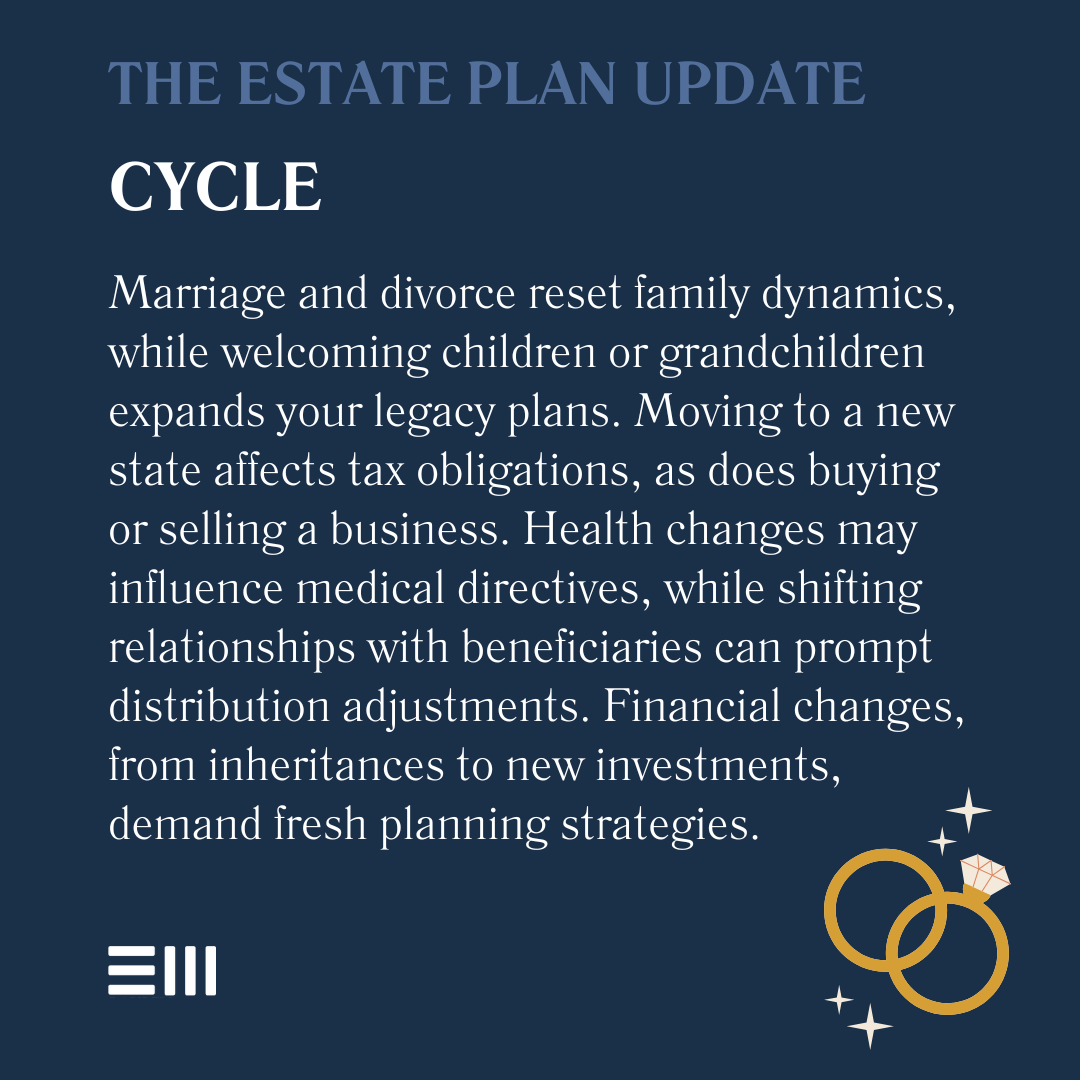Every day, families across America discover their loved ones' outdated estate plans in moments of crisis.
A grandmother's house accidentally passes to an estranged relative. A beloved family business falls into the wrong hands.
A child's guardian nomination names someone who moved abroad years ago. These real-world consequences of outdated estate plans ripple through generations, creating family conflicts and financial burdens that could have been prevented.
Your estate plan is like a family photograph – while it perfectly captures a moment in time, it doesn't reflect the changes that inevitably follow.
As your life evolves through marriages, career shifts, grandchildren, and retirement, your estate plan must transform alongside you to protect what matters most.
When to Review Your Estate Plan
Life rarely stays constant, and your estate plan should evolve alongside your changing circumstances.
Before diving into specific situations, it's important to understand that regular reviews help you maintain control over your legacy and prevent potential conflicts among your beneficiaries.
- Marriage, divorce, or remarriage: These life events can significantly impact how assets are distributed and may invalidate certain provisions.
- Birth or adoption of children or grandchildren: New family members often necessitate updates to inheritance plans and guardian nominations.
- Death of a beneficiary or executor: Losing a named beneficiary or executor requires immediate attention to ensure proper asset distribution.
- Significant changes in assets or debts: Acquiring new property, receiving an inheritance, or taking on substantial debt may require strategy adjustments.
- Relocation to a different state: Estate tax laws vary by state, potentially affecting your plan's effectiveness.
- Purchase or sale of a business: Business interests require special consideration in estate planning.
- Changes in tax laws or regulations: Tax law updates may create new planning opportunities or challenges.
- Updates to retirement accounts or insurance policies: Beneficiary designations need to align with your overall estate plan.
- Changes in relationships with beneficiaries: Family dynamics can shift, requiring updates to asset distribution plans.
- Health concerns or diagnoses: Medical conditions may influence healthcare directives and asset protection strategies.
Regular reviews of these factors ensure your estate plan continues to reflect your current wishes and circumstances, protecting both your legacy and your beneficiaries' interests.
Key Components to Update
Understanding which elements of your estate plan require attention during reviews helps ensure nothing is overlooked.
Here are the essential components that often need updating, along with specific considerations for each:
- Will and trust documents: Review asset distribution plans, executor appointments, and trust terms.
- Beneficiary designations: Ensure all financial accounts and insurance policies have current beneficiaries.
- Powers of attorney: Verify your chosen representatives still suit your needs.
- Healthcare directives: Update medical preferences and emergency contact information.
- Guardian nominations: Confirm chosen guardians remain willing and able to serve.
- Insurance policies: Review coverage amounts and beneficiary designations.
- Digital asset instructions: Include access information for online accounts and digital currencies.
- Business succession plans: Update transition strategies and key person provisions.
- Tax planning strategies: Adapt to new tax laws and threshold changes.
- Charitable giving arrangements: Review charitable beneficiaries and giving strategies.
Each component plays a vital role in your comprehensive estate plan and deserves careful consideration during reviews. Regular updates to these elements help maintain the effectiveness of your overall plan.
Common Mistakes to Avoid
Before examining specific errors, remember that awareness of potential pitfalls helps you maintain an effective estate plan that truly serves its intended purpose.
Many of these mistakes can have serious consequences for your beneficiaries.
- Failing to update beneficiary designations: Outdated designations can override your will's provisions.
- Overlooking digital assets: Cryptocurrency, online accounts, and digital files need specific instructions.
- Not accounting for new family members: Excluding new children or grandchildren can lead to family conflicts.
- Forgetting to revise healthcare directives: Medical preferences and emergency contacts should remain current.
- Neglecting to review tax implications: Tax law changes can significantly impact estate tax liability.
- Leaving outdated guardian nominations: Ensure nominated guardians remain willing and capable.
- Not communicating changes to family members: Clear communication helps prevent future disputes.
- Failing to consider state law changes: Moving between states may affect your plan's validity.
- Overlooking retirement account beneficiaries: IRA and 401(k) designations need regular review.
- Not updating business succession plans: Business transitions require careful planning and regular updates.
Understanding and avoiding these mistakes helps ensure your estate plan remains effective and achieves your goals.
Regular reviews can identify potential issues before they become problems for your beneficiaries.
Frequently Asked Questions About Estate Plans in Alabama
Estate planning raises many important questions, and staying informed helps you make better decisions about your legacy planning needs.
Here are answers to common questions about Alabama estate plan updates.
How Often Should I Update My Estate Plan?
Review your estate plan every 3-5 years and after any major life events.
Additionally, schedule reviews when significant tax law changes occur or when your financial situation changes substantially.
What Documents Need Regular Updates?
Your will, trusts, powers of attorney, healthcare directives, and beneficiary designations should all be reviewed regularly to ensure they reflect your current wishes and circumstances.
How Do Tax Law Changes Affect My Estate Plan?
Changes in federal and state tax laws can significantly impact your estate planning strategy, potentially requiring adjustments to maintain tax efficiency and protect your beneficiaries' interests.
Can I Update My Estate Plan Myself?
While minor updates might seem manageable, professional guidance ensures changes are legally valid and align with your overall estate planning goals. DIY updates can often create unintended consequences.
What Happens if I Don't Update My Estate Plan?
Outdated estate plans may lead to unintended inheritances, family conflicts, and unnecessary taxes or probate expenses. Your assets might not be distributed according to your current wishes.
How Do I Start the Update Process?
Begin by gathering current financial statements, legal documents, and a list of life changes since your last update. Professional guidance can help identify necessary modifications.
Secure Your Legacy Today
Your legacy deserves protection through a current, comprehensive estate plan.
Our experienced team stands ready to help you review and update your estate planning documents, ensuring your wishes are properly documented and your loved ones remain protected.
Schedule your estate plan review consultation today. Your family's future security is worth the investment of time today.


